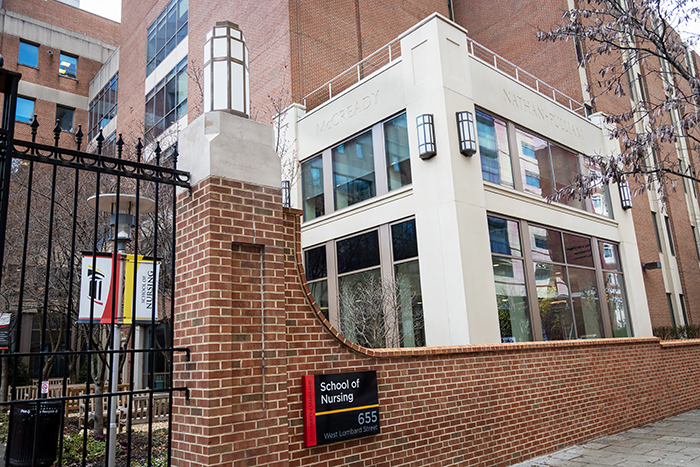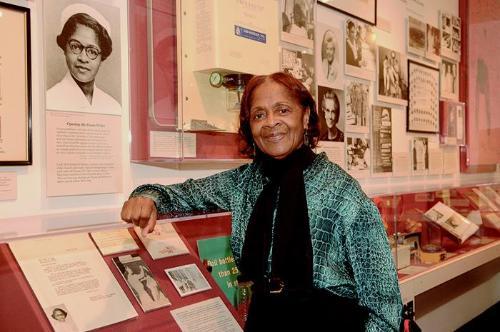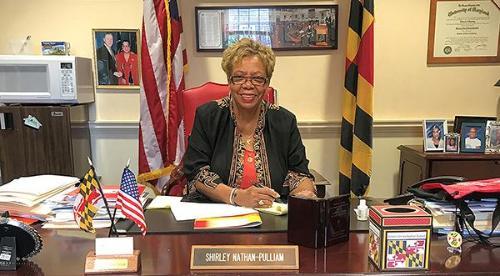Honoring Their Legacies
February 06, 2023 Giordana Segneri and Kirsten Hammerstrom
New names on the façade of the recently expanded portion of the School of Nursing building in Baltimore recognize the pioneering legacies of two remarkable UMSON alumnae.
When the School of Nursing recently expanded the footprint of its Baltimore building to create new space for learning, working, and reflecting, it gained additional exterior facades. It made sense that names should be engraved there, consistent with those of the seven other nurse pioneers whose names – Nightingale, Dix, Barton, Mahoney, Parsons, Wald, and Petry – have adorned the building’s exterior since the construction of the southern portion of the building in 1998.
A collaborative process involving faculty, staff, and student input resulted in the determination of two names to be engraved – one on the side facing the School’s courtyard and one on the perpendicular side, facing Lombard Street and the University of Maryland Medical Center – reflecting their importance to the School, the profession, and the future of health care: Esther E. McCready, DPS (Hon.) ’15, DIN ’53, the School’s first African American student, and Shirley Nathan-Pulliam, DHL (Hon.), MAS, BSN ’80, FAAN, a former Maryland state delegate and senator. They are two of the School’s inaugural Visionary Pioneers.
On the second floor of the expanded footprint, UMSON has installed an exhibit chronicling the alumnae’s personal histories and accomplishments as well as the historical context that highlights their achievements, complete with photographs and artifacts, presented in museum cases. The hope is that the exhibit will inspire anyone who passes through the hallway, especially students.
Excerpts from the exhibit are included here:
Esther E. McCready, DPS (Hon.) ’15, DIN ’53
 McCready was the first African American student to gain admittance to the University of Maryland School of Nursing, albeit after a legal battle. In so doing, she paved the way for countless future students and for the diversity that defines the School of Nursing’s student body today.
McCready was the first African American student to gain admittance to the University of Maryland School of Nursing, albeit after a legal battle. In so doing, she paved the way for countless future students and for the diversity that defines the School of Nursing’s student body today.
After graduating from Dunbar High School in February 1948, McCready sought admission to the School of Nursing. In keeping with the practice at that time, the School offered to pay for McCready to attend a Tennessee nursing school for African American students. McCready, with the support of the NAACP, sued for admission to the University of Maryland School of Nursing, and the District Court ruled against her in accordance with the then-legal doctrine of “separate but equal.”
Thurgood Marshall, who had already gained prominence for his work with the NAACP, assisted by Donald Gaines Murray, who had broken the color barrier at the University of Maryland School of Law, represented McCready in appealing the ruling, and Marshall argued the case. The Maryland Court of Appeals ruled in McCready’s favor in April 1950, ordering the University to accept her into the incoming class. The case helped lay the groundwork for the 1954 landmark Brown v. Board of Education Supreme Court decision.
McCready’s challenges did not end with her admission to the School. To retain a whites-only nursing student residence at Parsons Hall, McCready received a monthly stipend to cover expenses while she lived at home. This lasted until February 1951, when McCready was given a room to herself on a separate floor, maintaining segregation in the nurses’ residence.
McCready graduated in June 1953, completing her studies despite the hostility of students and faculty. She became friendly with a few students but also saw Black students who followed her dismissed from the School for poor grades or other, murky causes.
After graduation, McCready worked as a nurse in Baltimore and in New York City. While in New York, McCready pursued her passion for music and completed undergraduate and graduate degrees at the Manhattan School of Music. She sang with the Metropolitan Opera and taught in New York City public schools before returning to Baltimore in the mid-1990s.
In later years, the School that initially had refused to admit her welcomed McCready to its Board of Visitors, on which she served from 1996 - 2004, and to the Alumni Council, on which she served from 2002 - 12. In 2014, she was inducted as one of the School’s 25 Inaugural Visionary Pioneers; in 2015, she received an Honorary Doctor of Public Service degree from the University of Maryland, Baltimore. McCready passed away Sept. 2, 2020, at the age of 89.
Shirley Nathan-Pulliam, DHL (Hon.), MAS, BSN ’80, RN, FAAN
W hen she ran for, and won, a seat as a state delegate from Baltimore’s District 10 in 1994, Nathan-Pulliam became the first Caribbean-born person and the first African Caribbean registered nurse elected to the Maryland General Assembly.
hen she ran for, and won, a seat as a state delegate from Baltimore’s District 10 in 1994, Nathan-Pulliam became the first Caribbean-born person and the first African Caribbean registered nurse elected to the Maryland General Assembly.
A commitment to the process of nursing – evaluating problems, implementing solutions, improving outcomes – grounded Nathan-Pulliam’s work in the Maryland General Assembly developing policy and achieving reform for the residents of Maryland and of Baltimore, in particular. Early in her career, Nathan-Pulliam created a $2.6 million breast cancer diagnosis and treatment center for low-income women.
One of her most significant achievements was the passage of House Bill 86 in 2004, creating the Office of Minority Health and Health Disparities within the Maryland Department of Health. Dedicated to addressing the social determinants of health to eliminate health disparities, the office also provides outreach to racial and ethnic minority communities to ensure their participation in health programs.
After being elected to the Maryland Senate to represent District 44 in 2014, Nathan-Pulliam served as co-chair of the Education, Health, and Environmental Affairs Committee. In that role, she sponsored the 2017 “Health in All Policies” bill to develop a framework for improving health outcomes and reducing health inequities throughout Maryland by incorporating health considerations into decision-making in all policy areas. Recognizing that healthy populations rely on multiple, interrelated factors, the task force examined disparities not just in health care but also in transportation, education, environment, housing, and employment.
In 2018, knowing that Baltimore City was likely to have the most concentrated health disparities and inequities in the state, Nathan-Pulliam sponsored a bill to create a taskforce to identify problems and solutions through community partnerships to improve social determinants of health.
Although she resigned from the Maryland Senate in 2019, Nathan-Pulliam’s dedication to improving health care was recognized through the Shirley Nathan-Pulliam Health Equity Act of 2021, establishing a state commission on health equity. In addition to maintaining data, monitoring and advancing health equity, and creating a state plan for achieving that equity, the bill requires training in implicit bias and cultural competency for all health care providers.
In 2021, Nathan-Pulliam received the School of Nursing Dean’s Medal for Distinguished Service in recognition of her commitment to ensuring the delivery of equitable health care through her health policy initiatives, her work to reduce health inequities, and her efforts to strengthen health care systems for all Maryland residents.
UMSON is proud to continue the pioneering work of McCready and Nathan-Pulliam. We are actively focusing on addressing health disparities and social determinants of health in our local community. Involving faculty, staff, and students, these efforts pave the way for a healthier future for Baltimore and beyond and are recognized nationally as models of coordinated and collaborative community care.
To honor our alumnae’s legacies, UMSON has established scholarship funds in their names. The McCready Scholarship will provide endowed support for UMSON students from underrepresented populations. The Honorable Shirley Nathan-Pulliam, BSN ’80 Scholarship Endowment provides support for undergraduate students at UMSON who are Maryland residents from populations considered underrepresented in nursing. Recipients must have financial need and a demonstrated interest in health policy.
To support these scholarships, please visit nursing.umaryland.edu/give.